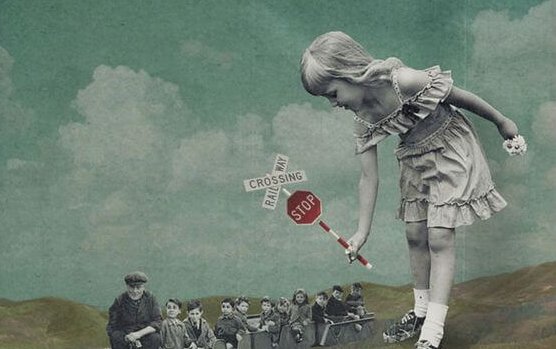How To Reshape Your Relationship to a Spoiled Child

The mother or father always does what they think is best. But just because they think that doesn’t mean it actually is.
It’s not easy to raise a child in the middle of a society with a huge influence and nasty temptations. There is all kind of information out there on the subject, but a lot of the time you’ll get stuck with mixed messages or ones that seem like they only exist in the imagination of the person who wrote it.
Real, flesh-and-bone parents make mistakes, get tired, get worked up, and go against parenting books.
The main point is that eventually kids grow up. And while they are, you can’t avoid the feeling that there’s a lot of room to improve.
Sometimes they’re very aggressive, or overly impulsive. They don’t listen and you don’t have the tools to make them. And in the end you realize that even though you’ve done all you can, your child is completely spoiled.
But don’t lose heart yet. You can always pick things back up, although the mission may be harder at some ages than others.
Here we’ll give you some advice to fix the mistakes that might have been made.

Signs that your child is spoiled
Before you do anything you should always make sure there really is a problem with their upbringing. Not all children have the same temperament.
Some of them have a really strong temperament and it’s not because of their upbringing. It’s just a natural inclination to have a strong attitude. There are some characteristics of spoiled children that really stand out. They…
- Throw tantrums and fits just like little children, but much more intensely. It’s a weapon they use to get what they want. There’s a more “sophisticated” alternative to tantrums: blackmail.
- Have frequent explosions where they totally lose control.
- Use strong language to express themselves.
- Frequently damage their own or other people’s belongings, either accidentally or on purpose.
- Consciously lie as a way to get what they want.
- Hardly do their chores, and won’t cooperate if you try to get them to do them.
- Delegate their responsibilities or it’s really hard for them to take on responsibilities.
- May even steal.
The more of these characteristics an older child has, the higher the chances we’ve got a spoiled child on our hands.
Of course the parents tried to raise their child to be responsible and have more self-control, but something went wrong and now the child might seem “uncontrollable.”
Bad behavior: causes and solutions
Children don’t behave badly just for the fun of it. In most, if not all cases, the parents have played a big role in how the child acts.
So the first thing to do is figure out why the child is behaving badly. It’s usually for one of these reasons:
- No one has showed them how to process the energy coming from their emotions, and they haven’t learned on their own. In most cases this inability to process is what leads to their impulsive, uncontrolled way of expressing the energy.
- The parents don’t know how to process their emotions either. Thus the example they’ve given to their child is far from adequate.
- They feel like they’ve been mistreated in some way. This could be because of indifferent or absent parents, or verbal or physical aggressiveness. They’ll rebel or show bitterness towards the mistreatment by behaving badly.
- They feel over-pressured. Some parents mistakenly believe that their child is a miniature adult, so they overload them with requirements or responsibilities. Once they reach a certain limit, the child will fight back and act out.
- The parents don’t know how to use their authority. They might set ambiguous, irrational, or unclear rules. Or they might not live up to the same rules they’ve given their child. And sometimes they’re afraid of hurting their child. Or they feel guilty for some reason, and try to make up for it by being overly permissive.

So the first thing to do is try to find the source of the problem. In other words, figure out which specific part or parts of raising them were problematic.
You’ll also have to store up love and patience, because you’ll definitely need them when you’re trying to reverse this situation.
And you’ll also need to be extremely honest. Parents have to be ready, willing and able to admit their mistakes and correct them. You can’t put this onto your children’s shoulders: it didn’t come to this without both sides playing a part.
There are three things that never fail when it comes to reversing poor parenting choices. The first is to set non-negotiable rules, starting with practical things like their schedule.
The second is to try to create some relaxed times where communication can flow. For example, people say that playing games makes it easier to communicate and helps children understand the purpose of rules.
Lastly, you can never go wrong with listening. Listening to your child attentively and trying to understand their world will strengthen and enrich your relationship.

Images courtesy of Rhed Fawell
This text is provided for informational purposes only and does not replace consultation with a professional. If in doubt, consult your specialist.








